Betta fusca - Betta fusca
Scientific name: Betta fusca
Common name: Betta fusca
Family: Osphronemidae
Usual size in fish tanks: 11 - 12 cm (4.33 - 4.72 inch)
014
Recommended pH range: 5.5 - 7
Recommended water hardness: 10 - 18°N (178.57 - 321.43ppm)
0°C 32°F30°C 86°F
Recommended temperature range: 22 - 26 °C (71.6 - 78.8°F)
The way how these fish reproduce: Spawning
Where the species comes from: South Asia
Temperament to its own species: peaceful
Temperament toward other fish species: peaceful
Usual place in the tank: Middle levels
Short Description
Betta fusca is a peaceful and graceful freshwater fish native to Southeast Asia. With its larger size and subtle beauty, this species thrives in well-planted aquariums with ample hiding spots and shaded areas. Known for their calm temperament, Betta fusca is an excellent choice for community tanks with other peaceful fish. Their intriguing breeding behavior and easy adaptability make them a favorite among aquarists.
Origin
Betta fusca is native to Southeast Asia, specifically Indonesia, Sumatra, and Borneo. These fish inhabit slow-moving streams, peat swamps, and shaded waterways where soft, acidic water provides the ideal environment for their survival.
Tank Requirements
To keep Betta fusca comfortable, a tank of at least 75 liters (20 gallons) is recommended. Maintain water temperatures between 22-26°C (71.6-78.8°F), a pH range of 5.5-7, and a water hardness of 10-18°N (178.57-321.43 ppm). A soft substrate and abundant vegetation, such as Java moss and floating plants, create a natural and secure environment. Provide driftwood and caves for additional hiding spots, and ensure minimal water flow to mimic their natural habitat.
Food and Feeding
Betta fusca is an omnivorous species that readily accepts a variety of foods. A high-quality flake or pellet should form the basis of their diet, supplemented with live or frozen treats such as bloodworms, brine shrimp, and white worms. Feed them small portions twice daily to maintain their health and vibrancy. Regularly varying their diet will also enhance their natural coloration.
Compatibility
Betta fusca is peaceful and pairs well with other non-aggressive fish of similar size. Ideal tankmates include rasboras, peaceful gouramis, and Corydoras catfish. Avoid housing them with fin-nipping species or overly active fish, as these can cause stress. Keeping them in a well-planted tank with plenty of cover helps maintain harmony.
Sexing
Sexing Betta fusca is relatively straightforward. Males have a broader head and longer pelvic fins compared to females. These differences are more pronounced during the breeding season when males exhibit heightened activity and readiness to spawn.
Breeding
Breeding Betta fusca is a fascinating process. The female initiates spawning by laying eggs, which are then scooped up by the male. Any missed eggs are collected by the female and passed to the male. The male broods the eggs in his mouth for approximately two weeks, although this duration may vary depending on water temperature. Once the fry are released, they can be fed newly hatched brine shrimp or finely powdered fry food to support their growth.
Lifespan
With proper care, Betta fusca can live for 3-5 years. Maintaining stable water conditions, providing a nutritious diet, and reducing stress are essential for ensuring their longevity.
Pictures
Bought by aqua-fish.net from jjphoto.dk.
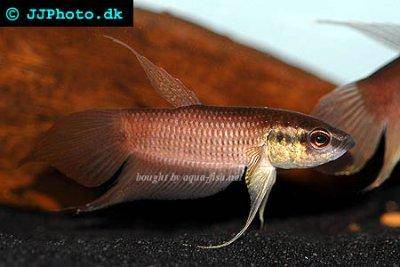



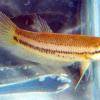 Akar
Akar 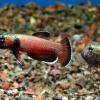 Whiteseam
Whiteseam 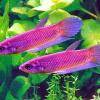 Giant
Giant 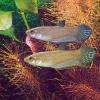 Betta
Betta 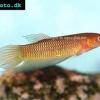 Slender
Slender 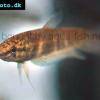 Betta
Betta 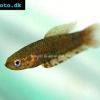 Brown’s
Brown’s  Snakehead
Snakehead 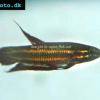 Wine
Wine 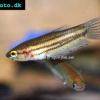 Edith’s
Edith’s 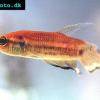 Blue
Blue 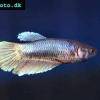 Peaceful
Peaceful 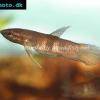 Kapaus
Kapaus 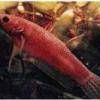 Eyespot
Eyespot 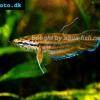 Spotted
Spotted 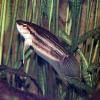 Forest
Forest 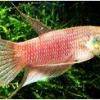 Schaller’s
Schaller’s 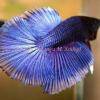 Siamese
Siamese 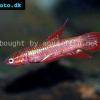 Chukai
Chukai 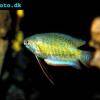 Banded
Banded 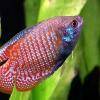 Dwarf
Dwarf 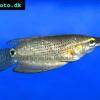 Frail
Frail 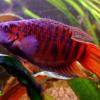 Paradise
Paradise 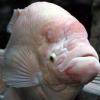 Giant
Giant 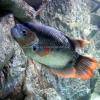 Giant
Giant 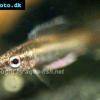 Licorice
Licorice 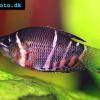 Chocolate
Chocolate 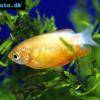 Honey
Honey 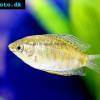 Thick
Thick 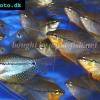 Pearl
Pearl 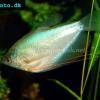 Moonlight
Moonlight 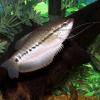 Snakeskin
Snakeskin 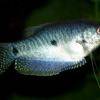 Blue
Blue